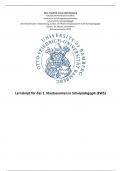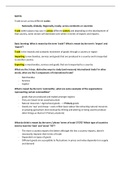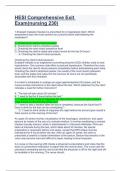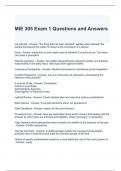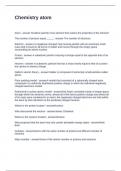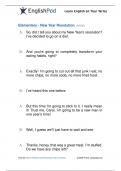ASSIGNMENT 2
SEMESTER 01
DUE DATE: 15 APRIL
6
2024
"Elevate Your Excellence: Where Distinction Meets Assurance in Every Assignment!"
,MRL2601 ASSIGNMENT 2 SEMESTER 1 – 2024 (347800)
DUE DATE: 15 APRIL 2024
1
,QUESTION 1.
1.1 Lesedi and Simphiwe registered Furnmax (Pty) Ltd, a company that sells office
equipment. The Memorandum of Incorporation of Furnmax (Pty) Ltd indicates that the
board of directors, consisting of Lesedi, Simphiwe, Carol and Precious, can appoint a
managing director who would be authorised to contract on the company’s behalf.
However, the board has never formally appointed a managing director. Nevertheless,
Lesedi, with the full knowledge of the other directors, has contracted with Office Supplies
Ltd for the supply of office equipment to Furnmax (Pty) Ltd on two occasions. On the
third occasion that Lesedi contracted with Office Supplies Ltd, Furnmax (Pty) Ltd denied
liability for the payment for the equipment based on the fact that Lesedi was never
appointed as the managing director. Upon being sued by Office Supplies Ltd, Furnmax
(Pty) Ltd opposed the claim for payment in terms of the agreement based on the fact that
Lesedi was not authorised to contract on the company’s behalf.
Explain with reference to relevant case law what Office Supplies Ltd would have to prove
in order to rely upon the doctrine of estoppel. (5)
Estoppel applies only when the agent did not have actual authority to bind the company. Take
particular note of the fact that the misrepresentation (i.e. that the agent had the necessary
authority when, in fact, he or she did not) must have been made by the company as principal.
Based on such misrepresentation, the company will be prevented (estopped) from denying
liability if the third party can prove that
(a) the company misrepresented, intentionally or negligently, that the agent concerned
had the necessary authority to represent the company.
(b) the misrepresentation was made by the company.
(c) the third party was induced to deal with the agent because of the misrepresentation.
(d) the third party was prejudiced by the misrepresentation.
In order for Office Supplies Ltd to rely upon the doctrine of estoppel, they would need to prove
several elements as outlined in the case law and legal principles provided:
Firstly, they must demonstrate that Furnmax (Pty) Ltd misrepresented, either intentionally or
negligently, that Lesedi had the necessary authority to represent the company.
This misrepresentation must have been made by the company itself, which would include
through its actions or lack thereof.
2
,Secondly, Office Supplies Ltd must establish that they were induced to deal with Lesedi as the
agent of Furnmax (Pty) Ltd because of this misrepresentation. This means they relied on the
representation of Lesedi's authority in entering into the contracts.
Finally, Office Supplies Ltd would need to show that they were prejudiced by the
misrepresentation. This could include suffering financial loss or detriment as a result of
entering into the contracts based on the belief that Lesedi had the authority to contract on
behalf of Furnmax (Pty) Ltd.
In Freeman and Lockyer v Buckhurst Part Properties (Mangal) Ltd, the court decided that
estoppel could not only arise from the Articles (note that this would be the Memorandum of
Incorporation in terms of the current Companies Act), but also because the company with full
knowledge and approval allowed an ordinary director to act as the managing director and, in
this manner, culpably represented that he was entitled to act.
3
, APPLICATION OF ESTOPPEL (STUDENTS DO NOT NEED TO INCLUDE THIS):
• Lesedi, in the facts above, did not possess actual authority. However, the company
allowed him to enter into binding contracts on behalf of the company on previous
occasions.
• Estoppel can be raised if Furnmax (Pty) Ltd denies liability based on the fact that
Lesedi lacked actual authority, because the impression was created that he was
authorized to do so. This establishes ostensible authority.
• Consequently, Furnmax (Pty) Ltd will be held to the misrepresentation it made
previously by allowing Lesedi to enter into contracts in the company’s name.
• If Lesedi had made the misrepresentation alone and the company had been unaware
of it, the contract would not bind the company, as Lesedi would not have had any
form of authority.
• Applying the Turquand rule in this scenario would be inappropriate, as Lesedi did not
possess actual authority subject to an internal requirement.
4



